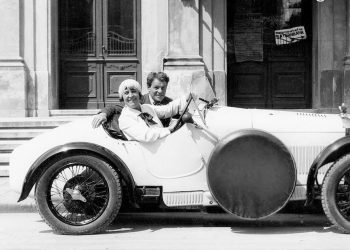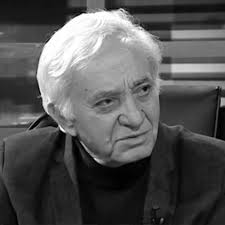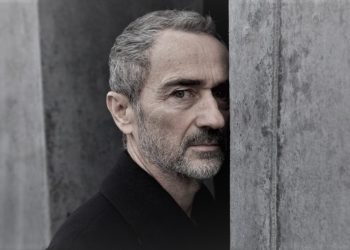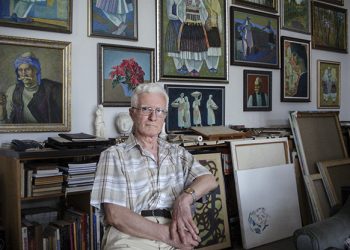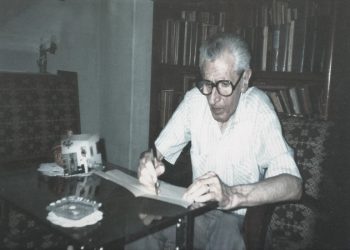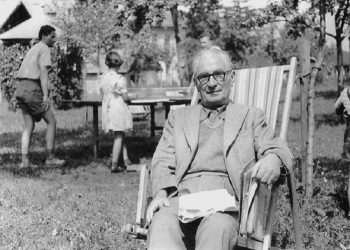Dashnor Kaloçi
Memorie.al publishes the unknown story of Prenk Jakova, originally from Gjakova but born and raised in the city of Shkodra at the age of seven, driven by his father, he became involved in several theatrical performances with “Bogdani” and “Artistic Societies”. Brotherhood, and when he was no more than 18 years old, he became the artistic leader of the Lyceum “Illyricum” music band, and his first pupils were: Cesk Zadeja, Tish Daija, Tonin Harapi, Simon John, Tonin Wheel, Zef Gruda, etc.
In September 1942, Prenka went to study in Italy, where she enrolled at the Rome Conservatory of Music “Santa Cecilia” in the clarinet branch, which she completed with high scores “and when she returned to Albania shortly afterward at the end of the war, he was arrested and held for some time in prison after a brother of his had been killed fighting against communist forces.
Prenka’s great success with the staging of the first Albanian opera, “Mrika”, where she assisted Enver Hoxha in the performance that was given in Tirana at the Higher Art Institute, where the Minister of Internal Affairs, Kadri Hazbiu and when Enver congratulated him for the colossal work he had done and asked him to do another opera for Skanderbeg, Prenka responded: “Comrade Enver, operas are not like the bread that he puts in the oven …” ?!
But even though he gave that answer, Enver Hoxha, Prenka got the job done and wrote the opera “Skanderbeg”, but when he brought it to Tirana for approval, it brought him many obstacles in asking him to remove some of it, which he did not accept, this caused him so much anxiety that on September 9, 1969, he ended his life in a tragic way …?!
It was September 9, 1969, when in the whole city of Shkodra, the bitter news that Prenk Jakova, one of the masters of Albanian music, who had written and performed the first opera, had died tragically. Albanian “Mrika”. Who was Prenk Jakova, from what family did he come from, where did he study and how did he manage to become one of the biggest music giants in Albania?
Family and first teachers
Prenk Jakova was born on June 27, 1917, in the city of Shkodra and his family is from Gjakova. Prenka’s grandfather was called Dede Jakova and in his youth he was fond of music, playing clarinet at the Saverian College of Shkodra. Deda died at a young age and he left a boy named Kola, who due to the difficult economic conditions of the family, went to work as a maid in Shkodra Bazaar. Prenka was the first child of Kole Jakova, who at that time worked in a jewelry store and at the same time knew and sang very well the folk song of Shkodra party, which greatly influenced the later formation of his son, Prenka. In addition to Prenka, Kola had other boys younger than his age, where two of them, Deda and Cescu, worked as photographers and musicians. At the age of seven, prompted by his father, Prenka was involved in various roles staged by the Theater Societies of the time “Bogdani” and “Brotherhood”. Prenka completed her primary education at Skanderbeg School in 1924-1929 and then enrolled and continued her education at Illyricum Lyceum, in the city of Shkodra. From the classical branch that Prenka studied in that Lyceum, he moved to the general branch of the state gymnasium in Shkodra, where he graduated in 1935. When he started the Illyricum Lyceum, he participated in the school’s music band, which later became the gang of the city of Shkodra, being its clarinetist. During this period Prenka formed as a musician and began conducting several choral groups and small orchestral formations, with which she began to style and elaborate a new folk song, such as: “Rudja Delja”, “Hajredini”, “The Bounty of a Brave”, “Go and Fly Like a Bird”, etc. Two of Prenka’s first teachers from whom he took his first music lessons were Martin Gjoka and Zef Kurti. When he was no more than 18 years old, Prenk Jakova became the artistic leader of the Lyceum “Illyricum” music band and his first students were: Cesk Zadeja, Tish Daija, Tonin Harapi, Simon John, Tonin Wheel, Zef Gruda, etc… At the time when Prenka took over the band of the city of Shkodra, he wrote his first scores by composing marching bands and poppies of folk songs of Shkodra.
Teacher in Brdica and Orosh
On January 2, 1936, Prenka was appointed teacher in the village of Bërdicë in the Prefecture of Shkodra. In this regard, the memoirs of his brother, Cescu, inter alia, read: “In that village Prenka not only performed the task of a teacher, but he took care and taught the song to almost all the students of the school. During that time Prenka learned himself without any methods and guitar, and when the methods came from abroad, he saw that there was nothing new from what he had learned out of necessity. In the summer of 1939, Prenka, with his savings, bought an accordion of the Settimio Sopreni brand, which had 80 bases and its method. Within a very short time, Prenka perfectly learned that instrument, at that time only known by ear and not by methods. After learning to play virtuoso with clarinets, guitars, and accordion, Prenka gained sufficient knowledge of brass and wood instruments, which she had begun teaching at the Shkodra Gymnasium. In 1939 Prenka was first separated from his family after being appointed teacher in the village of Orosh, Mirdita. In that village, he wrote a piece for accordion entitled “Mall” and then the song “Shepherd’s Flute”, the lyrics of which are still unknown today. This marked Prenka’s first attempt to write the words even the melody together, as was the concept of the folk song of Shkodra party. After staying for more than a year in Orosh, in 1940, Prenka moved to his hometown of Shkodra and at that time he wrote a children’s song cycle and opera with two acts entitled “The Garden of Dwarfs”. In the school year 1941-’42, Prenka was transferred to the Ulqin and Osho of Krajë Four-lane, where in order not to miss the artistic activities in the city of Shkodra, he used to ride that road daily, crossing 50 km. Prenka did not stay long in the four-couch, as in September 1942 he went to study in Italy, where he enrolled at the Rome Conservatory of Music “Santa Cecilia” in the clarinet branch, which he completed with high scores ”Reads the memoir of his brother Çesku.
Head of Culture House
In late 1944, he found Prenk Jakova as a teacher in the city of Shkodra, where he was recruited to help with the activities of the First Partisan Brigade Choir at the Youth House, where he was named responsible. At the time, Prenka was arrested by the Communists and held for several months in the investigator, after his brother was killed fighting against partisan pursuit forces in a village in Shkodra. His former pupils Cesc Zadeja and Tonin Harapi, who later became colossians of Albanian music, in the memoirs of their teacher Prenk Jakova, testify that during that period Prenka went to work at seven o’clock in the morning and worked tirelessly until the late-night hours, with the many choirs, soloists and instrumentalists in his patronage. Prenka was so firm, strict, and consistent in his work with amateurs that that to justify their lack of evidence, the required certification from the directorate of enterprise or school, or from the Professional Committee. At the time with the bands he was preparing, Prenka performed various shows, not only in the city of Shkodra but also in Ulcinj, Cetinje, Titograd, etc. In 1947, Prenka prepared and edited a series of songs entitled “Shkodra Wedding”, which, in addition to her successful performances in Shkodra, was also presented at the National Festival in Tirana. In addition to that grueling job, Prenka found time and worked in his home again, performing folk songs. That period marks the complete formation of Prenka as a self-taught musician. In the years 1948-1951, Prenka worked as a music teacher at the “11 January” and “Vasil Shanto” schools in the city of Shkodra and did not break for a day from the choir and orchestra rehearsals of the House of Culture. At the time he composed the song “New Wheat” with lyrics by Dhimiter Shuteriqi, which was staged by actor Pjeter Gjoka along with several other songs that were presented at the 1950 Festival in Tirana.
He writes the first opera
One of the culmination of the creativity of the famous composer Prenk Jakova is considered the first Albanian opera “Mrika”, which first appeared in 1958. But how did this opera originate and how did Prenka manage to write it? About this great event of Albanian culture, his brother Çesk wrote in his memoirs, among other things: “On the eve of the opening of the Festival of 1952, conditions were created for further steps in Albanian music, which had to cross the threshold of the song. This came about as the circumstances of a well-trained soloist and orchestra with symphonic formations were created. So in June 1952, the poet Lazar Siliqi was called upon to write something about the Hydro Power Plant being built on the Mat River. At first, it started as a song and then took the form of a double-act entitled “Light on Albania”, which appeared in July 1952 in Tirana. This was also the embryo of the first Albanian opera “Mrika”, which began preparations on May 2, 1958, and began staging November 12, 1958. The rehearsals for that performance were performed in parallel at the Theater House, in the Theater. old and in the new Theater “Migjeni”, after 15:00, which continued until November 27, when the general test was given. After this tedious work, on December 1, 1958, it premiered at the “Migjeni” Theater, and after several performances in that city, on December 27 and 28, it was given at the Higher Institute of Arts in Tirana. Enver Hoxha assisted in that performance along with most of the leadership and the diplomatic corps accredited in Tirana. At the end of the performance, Kadri Hazbiu took to the stage, who, after giving thanks to all her artists, raised a special toast for Prenk Jakova. The staging of the opera “Mrika” had a great echo outside of Albania, as in Italy, Sweden, Czechoslovakia, etc., which was learned from the numerous letters and telegrams that came to Prenka from these countries. A Prague-based art personality dealing with the history of world opera, in a letter, congratulated Prenka on the success he had achieved with amateurs in Shkodra and urged him to send pamphlets, posters, photographs and commercials for the show. ” in his memoirs of the success of the opera “Mrika”, Prenka’s brother Çesk.
Prenka’s friends and passions
Former students of Prenka, Zadeja, Harapi, Gruda, Rrota, Daija, etc., who later became the greatest masters of Albanian music, in the memories of their teacher, have shown that Prenka was a very simple man and in 1945-49 he had several offers to go to Tirana, but he refused because he could not be separated from Shkodra and the Cultural House of that city. He also declined the offer made in 1953 to come as a conductor in Tirana. A few years later, Prenka also rejected offers to pursue higher studies in Prague or Moscow. Whenever he returned from any overseas tour, he found in his suitcase only music albums and scorecards, as well as fish hooks for his amateur hunting companions with whom he often went to Buna and Shkodra Lake. Prenk Jakova was also passionate about football in Shkodra and when the Vojo Kushi stadium was built, he wrote the march of the Sport-Club “Vllaznija”, which was often sung by the fiery Shkodra fan. Although at different ages, friends and closest friends of Prenka’s music were: Kolë Jakova, (clarinetist and teacher), Loro Kovaci, (former clarinetist) Gjon Karma, (former flutist) Pjeter Gjoka, (tenor and actor) Ndoc Shllaku (violinist) and Pjeter Gjergji, guitarist and singer. Later, Prenka’s close friends and associates became conductor Mustafa Krantja, composer Tonin Harapi, and especially poet Lazar Siliqi.
Enver Hoxha’s request to Prenka
After the great success achieved by staging the first Albanian opera “Mrika”, during a visit to the city of Shkodra Enver Hoxha, he met with Prenka and told him that he had promised to perform an opera next to Skanderbeg. One of the high officials of the city of Shkodra, who was present in that conversation of Prenka with Enver Hoxha, testifies: “After those words of Enver Hoxha, Prenka replied: ‘Comrade Enver, opera work is not like bread that you put in when you want it in the oven. ‘ After Prenka’s answer, Enver Hoxha started laughing and ordered all Prenka’s conditions to be fulfilled in order for him to stage the opera “Skanderbeg”, recalled the former high official regarding Enver Hoxha’s conversation with Prenka Jakova… After that meeting, Prenka began working from morning until late at night to accomplish what Enver Hoxha had assigned him. He wrote all the music for the opera “Skanderbeg” and for several months only dealt with the separation of Turkish music from the Arabic one, which until then was confused by many composers. When she finished her music and brought it for approval in Tirana, Prenka was faced with many setbacks, and those tasked with evaluating it asked her to cut some pieces that they believed were stonewalled. Prenka flatly refused to do it, and the only one to defend it was Fadil Pacram, who at that time had openly opposed the old methods of conservatism. Although the opera “Skanderbeg” was successful and had great success, and Prenka was also congratulated by Enver Hoxha, the vicissitudes for its realization left deep traces in his spiritual state. This happened at a time when Prenka had his mother paralyzed at home, which greatly aggravated his mood.
The tragic death of Prenk Jakova
Out of these stresses, on September 9, 1969, the famous composer Prenk Jakova tragically ended his life by jumping off the second floor of the House of Culture. His funeral was attended by all the people of Shkodra, and only the Secretary of the League of Writers and Artists was sent from Tirana. The only favor he received from the communist state on the day of his burial was to allow him to be buried under the sounds of the city’s music band, which he had created himself four decades earlier. The musical creativity left by Prenk Jakova is very rich and consists of dozens of vocal works, elaborate choral songs, orchestral and choral pieces, bands, movie music, and even opera and opera. Prenk Jakova is regarded as one of the greatest Albanian music lovers of all time, due to his versatility and diverse musical creativity. Memorie.al




